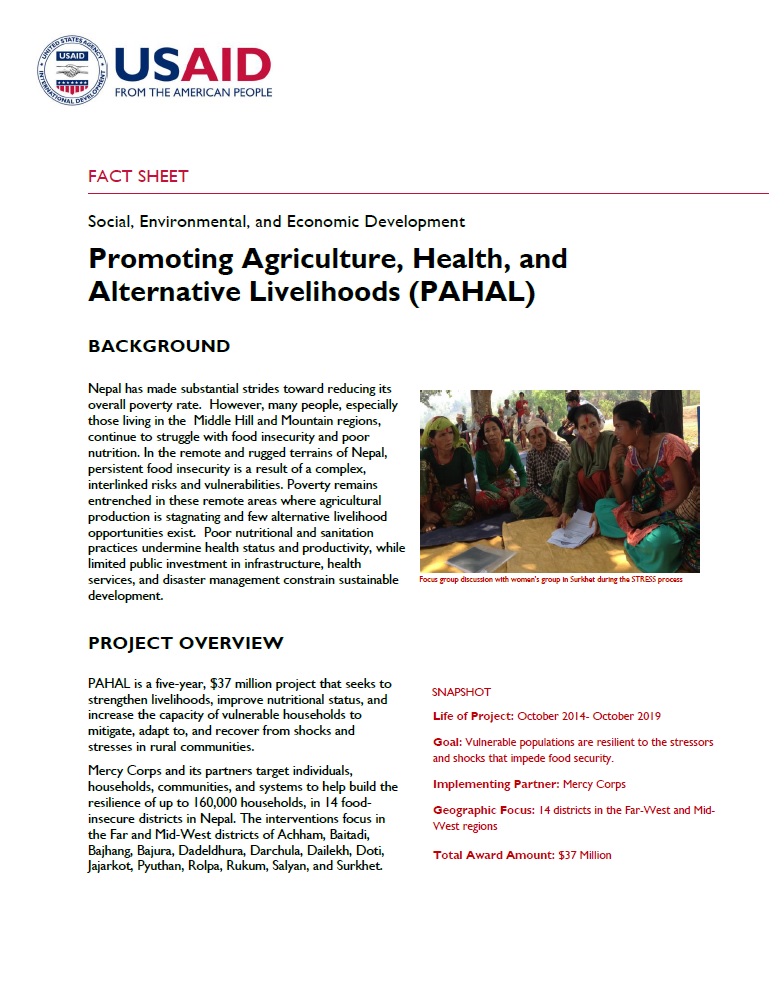BACKGROUND
Nepal has made substantial strides toward reducing its overall poverty rate. However, many people, especially those living in the Middle Hill and Mountain regions, continue to struggle with food insecurity and poor nutrition. In the remote and rugged terrains of Nepal, persistent food insecurity is a result of a complex, interlinked risks and vulnerabilities. Poverty remains entrenched in these remote areas where agricultural production is stagnating and few alternative livelihood opportunities exist. Poor nutritional and sanitation practices undermine health status and productivity, while limited public investment in infrastructure, health services, and disaster management constrain sustainable development.
PROJECT OVERVIEW
PAHAL is a five-year, $37 million project that seeks to strengthen livelihoods, improve nutritional status, and increase the capacity of vulnerable households to mitigate, adapt to, and recover from shocks and stresses in rural communities. Mercy Corps and its partners target individuals, households, communities, and systems to help build the resilience of up to 160,000 households, in 14 food-insecure districts in Nepal. The interventions focus in the Far and Mid-West districts of Achham, Baitadi, Bajhang, Bajura, Dadeldhura, Darchula, Dailekh, Doti, Jajarkot, Pyuthan, Rolpa, Rukum, Salyan, and Surkhet.
PLANNED ACTIVITIES
Mitigating risk of socio-ecological stressors and shocks that reduce local food security
- Increasing resilience to shocks and stressors by diversifying incomes and response strategies, strengthening participatory planning, and empowering communities to link to relevant Government of Nepal resources
- Providing disadvantaged groups with skills and forums necessary to increase their voice and agency
- Incorporating training on disaster risk management and mitigation
- Encouraging the use of water, sanitation, and hygiene facilities and improved sanitation practices
Strengthening and diversifying livelihoods for food-insecure populations
- Increasing agricultural production and finding appropriate non-agricultural livelihoods
- Increasing health and nutritional status by improving access to nutritious foods
- Providing training on financial, business skills, and vocational skills
- Improving marginalized groups’ access to and management of productive natural resources
PLANNED RESULTS
The PAHAL project seeks to achieve the following results over the course of five years:
- Improved knowledge and skills to manage and respond to the social and ecological hazards to food security
- Diversification of agriculture and non-agriculture based livelihoods through access to financial services, financial and business skills, and vocational training
- Increased access to markets for disadvantaged groups
- Improved productivity of crops and livestock as well as access to nutritionally diverse foods
- Adoption of natural resource management and disaster risk reduction practices
- Improved nutrition for pregnant and lactating women and their children (aged 6-23 months)
- Sustainable access to and appropriate use of safe water and sanitation facilities
- Increased influence over natural resource management for marginalized groups








Comment
Make a general inquiry or suggest an improvement.